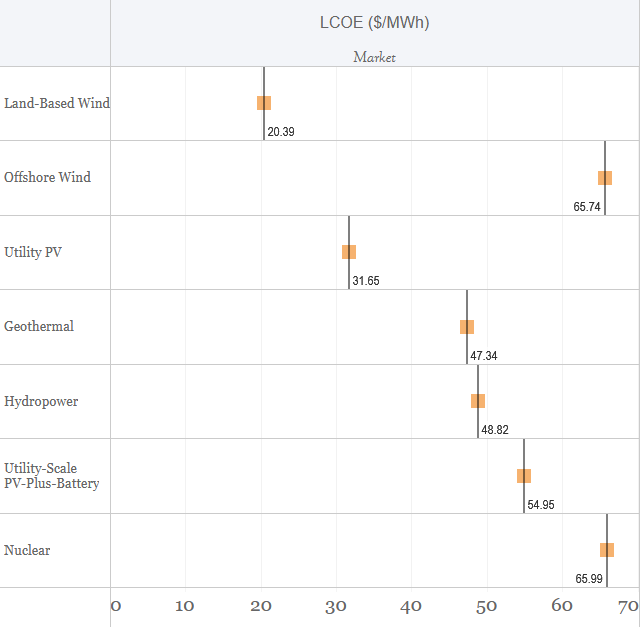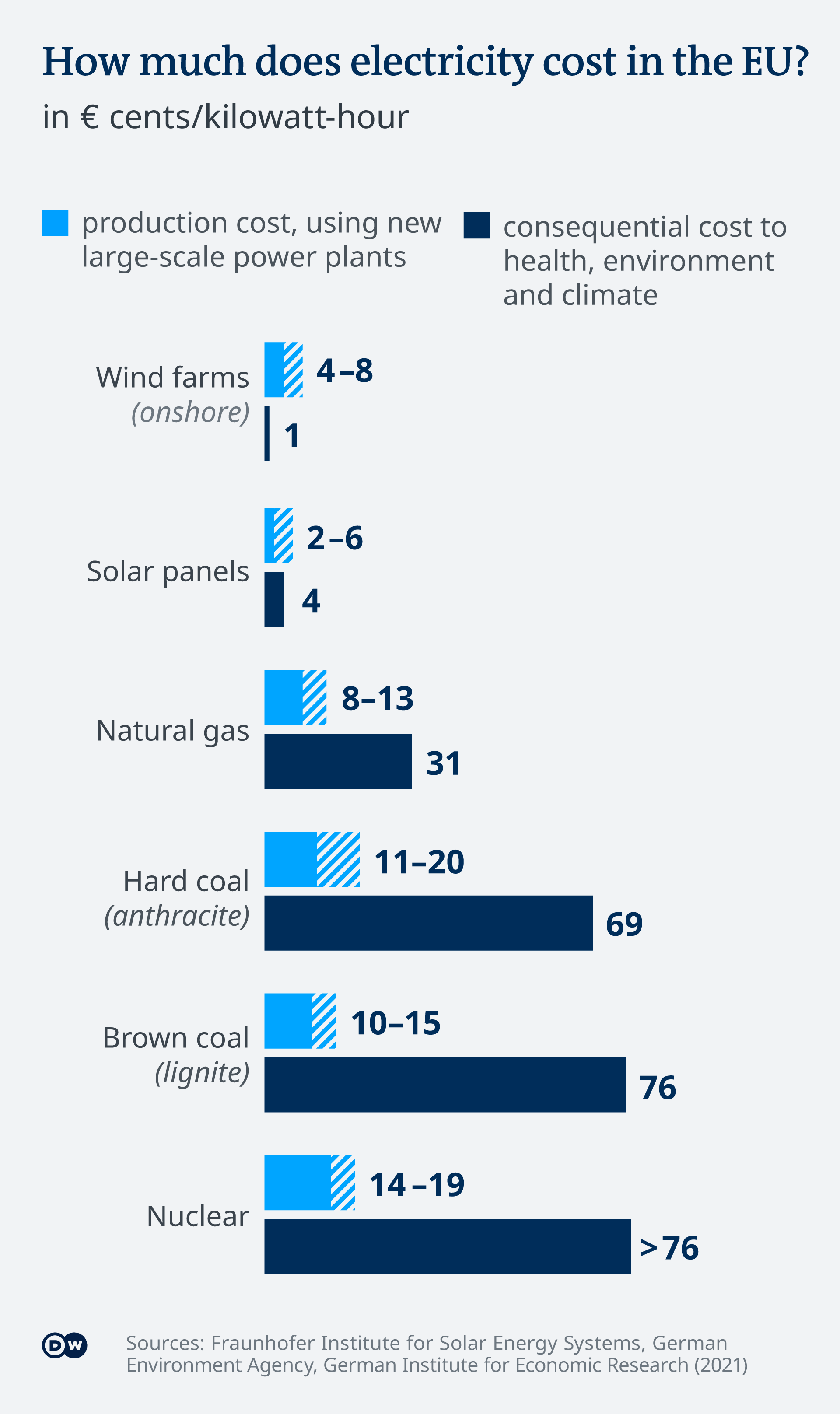244
German Chancellor Scholz speaks out against new nuclear power
(www.reuters.com)
News from around the world!
Please only post links to actual news sources, no tabloid sites, etc
No NSFW content
No hate speech, bigotry, propaganda, etc
Don’t import Reddit’s extremely ignorant takes on nuclear power here, please. Nuclear power is a huge waste of money.
If you’re about to angrily downvote me (or you already did), or write an angry reply, please read the rest of my comment before you do. This is not my individual opinion, this is the scientific consensus on the issue.
When it comes to generating electricity, nuclear is hugely more expensive than renewables. Every 1000Wh of nuclear power could be 2000-3000 Wh solar or wind.
If you’re about to lecture about “it’s not possible to have all power from renewable sources”, save your keystrokes - the majority of studies show that a global transition to 100% renewable energy across all sectors – power, heat, transport and industry – is feasible and economically viable. Again, this isn’t my opinion, you can look it up and find a dozen sources to back up what I am writing here.
This is all with current, modern day technology, not with some far-off dream of thorium fusion breeding or whatever other potential future tech someone will probably comment about without reading this paragraph.
Again, compared to nuclear, renewables are:
Nuclear power has promise as a future technology. It is 100% worth researching for future breakthroughs. But at present it is a massive waste of money, resources, effort and political capital.
Nuclear energy should be funded only to conduct new research into potential future improvements and to construct experimental power stations. Any money that would be spent on nuclear power should be spent on renewables instead.
Wow I'm surprised to see people are actually downvoting you and arguing about this. It's common knowledge that the cost, impact, and build-time of new nuclear plants makes them a poor choice for energy. Not only is wind/ solar cheaper, it's faster to build.
Redditors are unbelievably brainwashed in this topic, and a lot of Redditors moved over to Lemmy. I have dragged this metaphor to water countless times before, and when I suggest that they could consider drinking, they just arrogantly declare that I don't understand the facts around liquids, that I don't have any basis for my claims that they should drink it, and that by arguing that people should drink more water, I somehow supporting Coca-Cola.
It's also common knowledge that the more often you build something, the lower its price tends to go as that knowledge spreads. It's part of the reason it's so expensive to build trains in the US and so cheap in South Korea and Spain.
This famously isn’t true for nuclear power. It just keeps getting more expensive.
https://www.sciencedirect.com/science/article/abs/pii/S0301421510003526
And this research was done before Fukushima, which increased costs even further.
This is just more reasons to prioritise the already cheaper renewables, isn't it?
Also worth noting are the centralization and security risk aspects of nuclear
You can have this copy/paste from like 5 minutes of googling. You can also run your own study yourself by just googling "average kwh price nuclear" and "average kwh price wind" and see how it looks. You can also google "average co2 eq emissions total lifetime nuclear" and likewise for wind/solar PV. This is extremely simple stuff, guys. I am basically saying, "lentils are cheaper than steak" and you're asking for citations.
2022 Electricity ATB Technologies and Data Overview, annual technology baseline:
https://www.dw.com/en/fact-check-is-nuclear-energy-good-for-the-climate/a-59853315
Wow look isn't it crazy how nuclear is the most expensive one?
Mycle Schneider, author of the World Nuclear Industry Status Report: "Nuclear power plants are about four times as expensive as wind or solar, and take five times as long to build. When you factor it all in, you're looking at 15-to-20 years of lead time for a new nuclear plant."
Differences in carbon emissions reduction between countries pursuing renewable electricity versus nuclear power, published in nature energy: "We find that larger-scale national nuclear attachments do not tend to associate with significantly lower carbon emissions while renewables do. "
and this is a short intro to why a (60%/40%) split between renewables and nuclear may be the most accessible fossil free solution, and why the value of adding more variable renewables to a grid falls sharply the closer you get to 100%.
Also, the last article you posted is paywalled.
I hate when people say “stop importing it from Reddit” like half of us didn’t migrate from there.
What the fuck did you expect to happen? Reddit didn’t believe that. The users that participated in the site did.
Although I agree with this comment, this is exactly what the covidiots said. "Just google it". If you want us to believe your controversial opinion, you're going to want to take the time to add the most credible sources you can find to back you up.
I agree with you on nuclear being more expensive as all facts point that way and future nuclear technology, but i dont understand how we could transition to a 100% renewable energy sector, It would be good if you could give a citation or explanation for that. Diverse and distributed source is how we get an energy secure grid, renewables could help with the distributed source part, but when it comes to diversity the popular renewable technologies wind and solar are very limited, both of these source cant power a base load without batteries (this applies mostly to solar, but wind too has low output at night). Also there is this issue witj managing generation and demand (Nuclear too have issue with this as its not possible to quickly adjust nuclear power generation like other conventional spurce). A full renewable energy grid would depend on batteries, currently we have much limitation with batteries. Mature technologists of acid based batteries require huge areas, and lithium based ones would require rare lithium which its mining alone would cause alot of pollution, and relying on other alt battery technology itself would be a long stretch as its development and commercialisation to usable form would take years to achieve as the same case afforable future nuclear technology.
Other alt renewable energy like geothermal could help with base load (not sure, someone could correct me if this is not the case), but itsnt possible everywhere. The same goes for tidal plant as it depends on geography and specific time of day. With this scenarios if we were to move to a 100% renewable grid then, the price for energy will increase at night time in a way that i think could reach nuclear energy rate.
A 100% renewable grid would need a lot of batteries and that too could drive the price up and possibly contribute to climate change. Also solar panel manufacturing is a very intense process with a lot of carbon impact, i read this on a text during my academics (havent checked the source for this other than that).
The carbon impact mostly is energy used in production. So it's high when you produce solar panels powered by shitty coal plants and basically non-existent when you have build them once and are constructing replacements with solar energy. (The same is true for nuclear btw and also often completely misrepresented in discussion. Nuclear plants in a country full of nuclear plants have a much lower carbon footprint. That's not some technological or scaling effect as often claimed but the simple fact of building the reactor and enriching the fuel with energy already green)
Actually no. The grid would need batteries (but also alternatives like capacitors or fly-wheels) for short-term stabilisation, but the amount is limited. The grid also need long-term storage but here batteries are completely inadequate. Also the requirements for batteries are usually misrepresented. No, we don't neen some bullshit Lithium-ion batteries or similar stuff requiring rare earths and other rare ressources. Those are used in handhelds where energy density is the main concern. I can perfectly build a stationary grid battery cheaply and without rare ressources as nobody cares if that building-sized installation is 5% bigger and 30% heavier than a build with lithium-ion batteries and also gets 20° hotter in operation... because it's not a handheld.
Case in point: One of the very first things that happened in Germany the moment the new government was sworn in and long before they could actually do anything: energy companies started installing the first battery-based storage units as they now were no longer intentionally sabotaged in creating storage infrastructure for renewables. What did they use? Car battereis. Used ones that were already deposed. Dirt cheap for costs barely above the recycling value. Because the requirements in grid stabilisation and short-term storage are indeed completely different that in cars (again: energy densitiy vs. low price and car batteries with only 60% of their capacity left were completely okay for that job).
Thorium reactors were made those in the 60s, they weren't pursued because thorium can't make nuclear bombs.
How do we deal with balancing the uneven load renewables produce in places where pumped hydro isn't an option for power storage? I.e. lowland areas. Here in the southeastern US, night almost always means no wind as well as the obvious no sun. Chemical batteries, afaik, aren't a sustainable solution ATM.